Thracian treasure
The Thracians (Bulgarian: Траки, Ancient Greek: Θρᾷκες, Latin: Thraci) were a group of Indo-European tribes inhabiting a large area in Central and Southeastern Europe, centred in modern Bulgaria.[2] They were bordered by the Scythians to the north, the Celts and the Illyrians to the west, the Greeks to the south, and the Black Sea to the east.

The Thracians were skillful craftsmen. They made beautifully ornate golden and silver objects such as various kinds of vessels, rhytons, facial masks, pectorals, jewelry, weapons, etc. These show strong, and increasing, influence from the neighbouring cultures, especially the Greeks. They used to bury rich hoards of precious objects both to hide them in times of enemy invasions and unrest as well as for ritual purposes. To date, more than 80 Thracian treasures have been excavated in Bulgaria, the cradle of the Thracian civilization. Refer to the map which explicitly shows the territory of present-day Bulgaria.
Thracian treasure hoards
Thracian treasures
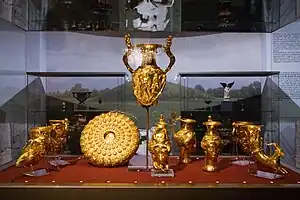
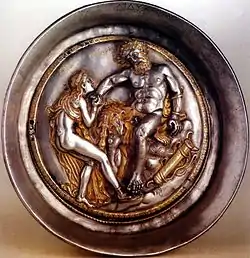
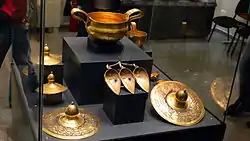
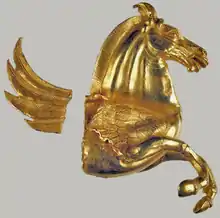 Vazovo Thracian Pegasus
Vazovo Thracian Pegasus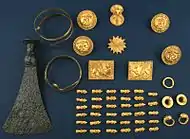 Kralevo Treasure
Kralevo Treasure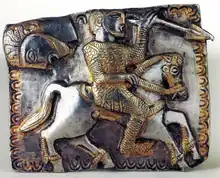 Letnitsa treasure
Letnitsa treasure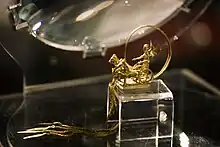 Sinemorets Gold figurines
Sinemorets Gold figurines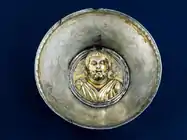 Yakimovo Thracian Treasure
Yakimovo Thracian Treasure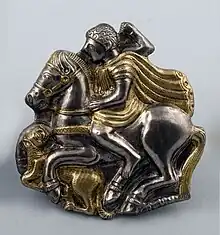
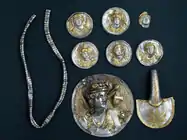 Ravnogor Thracian Treasure
Ravnogor Thracian Treasure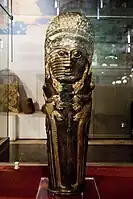 Mogilanska Mogila Funeral Offerings
Mogilanska Mogila Funeral Offerings.jpg.webp) Golden mask of Teres I, the first ruler of the Odrysian kingdom
Golden mask of Teres I, the first ruler of the Odrysian kingdom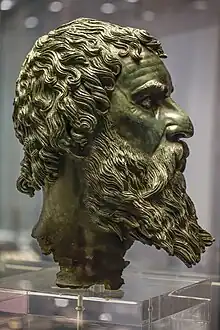 Bronze Head of Seuthes III found in Golyamata Kosmatka
Bronze Head of Seuthes III found in Golyamata Kosmatka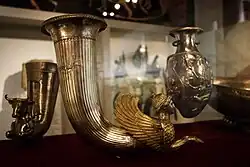 King Cotys I's Borovo Treasure
King Cotys I's Borovo Treasure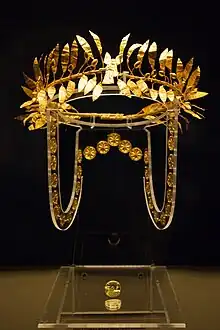 Odrysian Wreath of Cersobleptes, Zlatinica-Malomirovo
Odrysian Wreath of Cersobleptes, Zlatinica-Malomirovo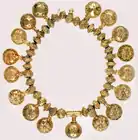 A thracian golden necklace found in Arabadjiiska Mogila
A thracian golden necklace found in Arabadjiiska Mogila Thracian helmet found in Pletena
Thracian helmet found in Pletena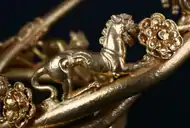 Golden treasure found at the Great Sveshtari Mound
Golden treasure found at the Great Sveshtari Mound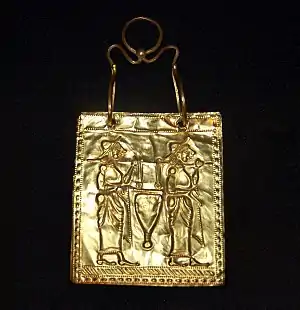
References
- The Oxford Classical Dictionary by Simon Hornblower and Antony Spawforth, ISBN 0-19-860641-9, page 1514,"The kingdom of the Odrysae, the leading tribe of Thrace extended in present-day Bulgaria, Turkish Thrace (east of the Hebrus) and Greece between the Hebrus and Strymon except for the coastal strip with its Greek cities."
- Christopher Webber, Angus McBride (2001). The Thracians, 700 BC–AD 46. Osprey Publishing. ISBN 1-84176-329-2.
Further reading
- The Yurta-Stroyno Archaeological Project. Studies on the Roman Rural Settlement in Thrace. P. Tušlová – B. Weissová – S. Bakardzhiev (eds.). Prague: Charles University, Faculty of Arts, 2022. ISBN 978-80-7671-068-9 (print), ISBN 978-80-7671-069-6 (online: pdf)
- Bunker, Emma C. (2002). Nomadic art of the eastern Eurasian steppes: the Eugene V. Thaw and other New York collections. New York: The Metropolitan Museum of Art. ISBN 978-0-300-09688-0.
External links
- Panagyurishte Treasure
- The Treasures of the Ancient Thracians
- http://www7.nationalgeographic.com/ngm/0612/feature4/
- http://www.archaeology.org/0503/abstracts/kitov.html
- http://news.bbc.co.uk/2/hi/europe/3999145.stm
- http://www.turkishdailynews.com.tr/article.php?enewsid=53342
- Golden Thracian Mask, 5th century B.C.